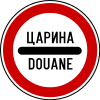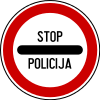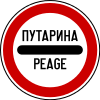Road signs in Serbia
The road signs, used on the Serbian road network, are regulated by the "Regulation of Traffic Signs" (Serbian Cyrillic: Правилник о саобраћајној сигнализацији, Serbian Latin: Pravilnik o saobraćajnoj signalizaciji, which was last time modified in 2017.[1]
The road signs follow the Vienna Convention on Road Signs and Signals of 1968, and the former Yugoslav standard road signs, used by the successor states of SFR Yugoslavia. Inscriptions are in both Cyrilic and Latin alphabets. They are also used in Kosovo[lower-alpha 1], although some of these signs were superseded by the Albanian road sign system, itself a copy of the Italian road sign system. In Montenegro, these road signs are only written in the Latin script.
Category A: Warning signs
 Left curve
Left curve Right curve
Right curve Double curve, first at left
Double curve, first at left Double curve, first at right
Double curve, first at right Series of dangerous twists
Series of dangerous twists Steep uphill
Steep uphill Steep downhill
Steep downhill Road narrows (both sides)
Road narrows (both sides) Road narrows on left
Road narrows on left Road narrows on right
Road narrows on right Mobile bridge
Mobile bridge Quayside/River Bank
Quayside/River Bank Bumpy road
Bumpy road Potholes
Potholes Traffic-calming bumps
Traffic-calming bumps Slippery roads
Slippery roads Loose chippings
Loose chippings Rockfall (left)
Rockfall (left) Rockfall (right)
Rockfall (right) Pedestrian crossing
Pedestrian crossing Children area
Children area Cyclists crossing
Cyclists crossing Domestic animal crossing
Domestic animal crossing Wild animal crossing
Wild animal crossing Roadworks
Roadworks Vertical traffic light
Vertical traffic light Horizontal traffic light
Horizontal traffic light Low-flying aircraft
Low-flying aircraft Crosswinds from left
Crosswinds from left Crosswinds from rightt
Crosswinds from rightt Bidirectional road traffic
Bidirectional road traffic Tunnel
Tunnel Other hazards
Other hazards Intersection with right-priority rule
Intersection with right-priority rule Intersection on a priority road with a non-priority road
Intersection on a priority road with a non-priority road Intersection on a priority road with a non-priority road from left
Intersection on a priority road with a non-priority road from left Intersection on a priority road with a non-priority road from right
Intersection on a priority road with a non-priority road from right Merging traffic from left
Merging traffic from left Merging traffic from right
Merging traffic from right Roundabout
Roundabout Tram crossing
Tram crossing Gated level crossing
Gated level crossing Non-gated level crossing
Non-gated level crossing Crossbuck (single-track)
Crossbuck (single-track) Crossbuck (double-track)
Crossbuck (double-track) Distance-panels for gated level crossing
Distance-panels for gated level crossing Distance-panels for non-gated level crossing
Distance-panels for non-gated level crossing Dangerous shoulder
Dangerous shoulder Traffic queues likely
Traffic queues likely
Category B: Prohibitory signs
 Give Way
Give Way Stop
Stop No entry
No entry Forbidden for road vehicles
Forbidden for road vehicles Forbidden for motor vehicles, except solo motorcycles
Forbidden for motor vehicles, except solo motorcycles Forbidden for buses and coaches
Forbidden for buses and coaches Forbidden for HGVs (lorries/trucks)
Forbidden for HGVs (lorries/trucks) Forbidden for water-pollutants
Forbidden for water-pollutants Forbidden for explosive goods
Forbidden for explosive goods Forbidden for dangerous goods
Forbidden for dangerous goods Forbidden for trailers
Forbidden for trailers Forbidden for articulated vehicles
Forbidden for articulated vehicles Forbidden for agricultural vehicles
Forbidden for agricultural vehicles Forbidden for motorcycles
Forbidden for motorcycles Forbidden for mopeds
Forbidden for mopeds Forbidden for bicycles
Forbidden for bicycles Forbidden for horsecarts
Forbidden for horsecarts Forbidden for human-powered vehicles
Forbidden for human-powered vehicles Forbidden for motor vehicles, motorcycles, and horsecarts
Forbidden for motor vehicles, motorcycles, and horsecarts Forbidden for buses, coaches, agricultural machinery and horsecarts
Forbidden for buses, coaches, agricultural machinery and horsecarts Maximum width
Maximum width Maximum height
Maximum height Maximum weight
Maximum weight Maximum weight per axles
Maximum weight per axles Maximum length
Maximum length Safe distance
Safe distance Left turns forbidden
Left turns forbidden Right turns forbidden
Right turns forbidden U-turns forbidden
U-turns forbidden Overtaking forbidden
Overtaking forbidden Overtaking forbidden for HGVs and buses
Overtaking forbidden for HGVs and buses Speed limit
Speed limit Honking forbidden
Honking forbidden Customs
Customs Police
Police Tolls
Tolls No parking/waiting
No parking/waiting No stopping
No stopping
Category C: Mandatory signs
Category D: Priority signs
Category E: Direction signs
Serbia (and also the rest of Yugoslavia) uses a slightly different color-coding system for routes, compared to most European nations. Along with Germany and Norway, the former Yugoslav countries are the only ones to use black text on yellow for non-roadworks purposes. The color coding is as such:
| Panel background | Border | Lettering | Usage |
|---|---|---|---|
| Green | White | White | Motorways |
| Blue | White | White | Expressways |
| Yellow | Black | Black | State (trunk) roads |
| Brown | White | White | Recreational attractions |
| White | Black | Black | Inner-city destinations |
Category F: Additional panels
References
Notes
- Kosovo is the subject of a territorial dispute between the Republic of Kosovo and the Republic of Serbia. The Republic of Kosovo unilaterally declared independence on 17 February 2008, but Serbia continues to claim it as part of its own sovereign territory. The two governments began to normalise relations in 2013, as part of the 2013 Brussels Agreement. Kosovo is currently recognized as an independent state by 97 out of the 193 United Nations member states. In total, 112 UN member states recognized Kosovo at some point, of which 15 later withdrew their recognition.
| Wikimedia Commons has media related to Road signs in Serbia. |